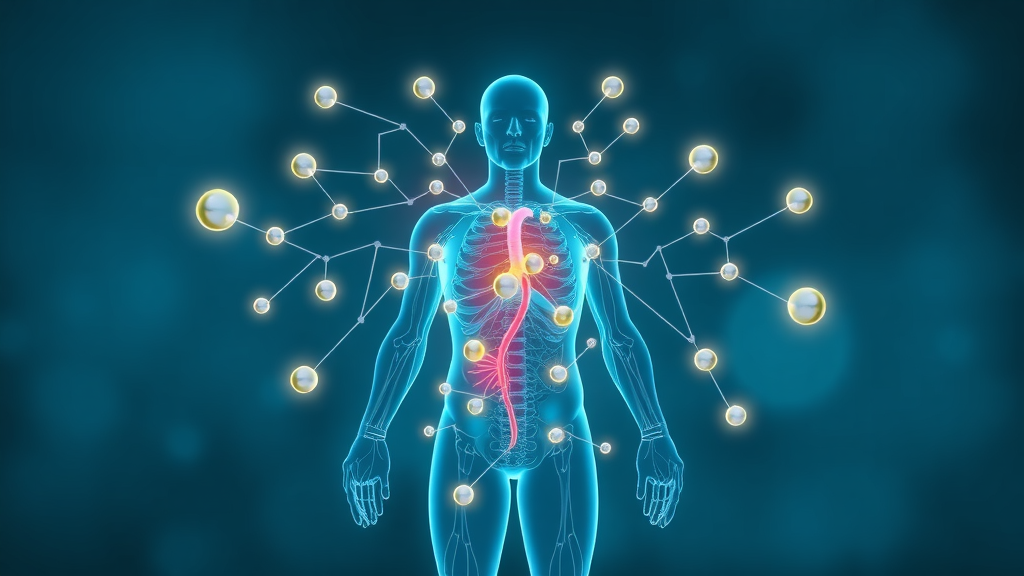
Did you know? Over 80 million people in the United States may be affected by hormone imbalance and exposure to endocrine disruptors—often without realizing it. While hormone therapy and replacement therapy are common solutions, embracing natural endocrine support through adaptogenic herbs offers a holistic approach to hormone optimization with fewer side effects. In this comprehensive guide, you'll uncover the science, strategies, and practical steps to balance your hormones, protect your quality of life, and make informed health choices.
Did You Know? Endocrine Disruptors Affect Millions—Unlocking the Complete Guide to Natural Endocrine Support
Endocrine disruptors are substances found in our everyday environment—plastics, pesticides, even some personal care products—that can interfere with the delicate balance of our endocrine system. These disruptors mimic, block, or alter the normal function of hormones, leading to a domino effect on bodily functions such as metabolism, energy levels, and reproductive health. Recent research from the Endocrine Society highlights that both men and women across developed nations, including the United States, are increasingly susceptible to these hidden risk factors.
The impact of endocrine disruptors is multifaceted. They contribute to the rise in hormone imbalance symptoms, from unexpected weight gain and fatigue to mood disturbances, hot flashes, and irregular menstrual cycles. As chemical messengers, hormones are essential for coordinating nearly every system in the human body—meaning disruptions can impair cardiovascular health, fertility, muscle mass, and even increase the risk of chronic diseases. By recognizing these disruptors and exploring natural avenues of endocrine support—especially through adaptogenic herbs—you take a proactive step toward hormone optimization and improved quality of life.
How This Complete Guide to Natural Endocrine Support Empowers Hormone Optimization
-
In-depth understanding of adaptogenic herbs for hormone balance
-
The science behind natural endocrine support
-
Ways to identify and reduce exposure to endocrine disruptors
-
Hormone optimization strategies with adaptogens
-
Practical tips for addressing hormone imbalance naturally

Understanding Hormone Imbalance and Endocrine Disruptors: The Foundation for Natural Endocrine Support
What Is Hormone Imbalance? Recognizing Symptoms and Causes

Hormone imbalance occurs when hormones, the body's chemical messengers, are present in incorrect proportions. This imbalance often leads to a variety of symptoms including persistent fatigue, unexplained weight gain, mood swings, hot flashes, low muscle mass, sleep disturbances, and, in some cases, fertility issues or changes to the menstrual cycle. In both men and women, hormone levels naturally fluctuate with age, lifestyle, and stress; however, environmental factors such as diet, exposure to endocrine disruptors, and even chronic inflammation can tip the scales further.
Recognizing hormonal imbalances is the first step to restoration and hormone optimization. It's important to note that while some symptoms may be subtle, their cumulative effect can significantly diminish your quality of life over time. Many people are unaware of the underlying causes or see side effects as a normal part of aging or daily stress. By understanding the root causes and the role of external factors like endocrine disruptors, you can begin to make informed decisions about natural endocrine support.
Early intervention through lifestyle shifts, nutrition, and exploring natural solutions such as adaptogenic herbs can promote hormone balance and provide lasting improvements to energy levels, mood, and overall health. Consulting a healthcare provider for proper diagnosis remains crucial, but self-awareness empowers you to proactively engage in your hormone optimization journey.
The Role of Endocrine Disruptors in Hormone Optimization Challenges
Endocrine disruptors are widespread in our environment and pose a real challenge in achieving hormone optimization. These disruptors often act as impostors, mimicking or blocking the body’s natural hormones and impacting crucial systems—particularly the reproductive, thyroid, and adrenal glands. Major sources of endocrine disruptors include plastic water bottles, food packaging, conventional cleaning products, and non-organic produce treated with pesticides. Such continuous low-level exposure is linked to increased risk of hormone-related disorders, including weight gain, reduced fertility, hormonal imbalance, and even cardiovascular disease.
Addressing these external threats is essential for natural endocrine support. By minimizing exposure—choosing BPA-free containers, prioritizing organic foods, and opting for natural cleaning solutions—you can significantly decrease your risk factor for hormone imbalance. As people become more aware, there is a rising demand for both preventive strategies and natural approaches to hormone optimization that do not involve pharmaceutical interventions or replacement therapy, unless medically necessary.
Empowering yourself with knowledge about endocrine disruptors allows you to create a safer, healthier home and helps your body better respond to other interventions such as adaptogenic herbs. Small lifestyle adjustments can yield substantial benefits in hormone production, regulation, and overall wellness.
Endocrine Society Insights: Current Trends and Research

Leading organizations, including the Endocrine Society , are at the forefront of researching how environmental factors affect hormone levels and the endocrine system as a whole. Recent studies have shown a marked increase in the prevalence of hormone-related disorders—highlighting the impact of exposure to endocrine disruptors, dietary patterns high in processed foods, and sedentary lifestyles. These trends call for a comprehensive, holistic approach to hormone optimization that extends beyond traditional hormone replacement therapies.
Innovative research continues to explore the potential for adaptogenic herbs and lifestyle interventions to restore and maintain hormone balance. The Endocrine Society’s ongoing efforts stress the importance of education: helping the public understand risk factors, side effects, and promising natural support techniques. Incorporating credible research from clinical trials and meta-analyses, they confirm that both prevention and targeted natural interventions are vital for protecting quality of life and promoting optimal hormone production throughout all stages of life.
Access to current trends and expert insights enables individuals to make informed decisions, prioritize safe practices, and customize their own pathway to hormone optimization. As a result, more people are turning to integrative and natural approaches, such as adaptogenic herbs, in addition to regular healthcare consultations.
How Adaptogenic Herbs Influence Hormone Optimization and Natural Endocrine Support
Science Behind Adaptogens: A New Era of Natural Endocrine Support
Adaptogenic herbs are unique botanicals recognized for their ability to enhance the body's resilience to stress and restore baseline hormone levels. Unlike pharmaceutical hormone replacement therapy, adaptogens work by gently modulating the body’s endocrine responses, supporting homeostasis, and protecting against the physiological toll of chronic stress. Research has shown that adaptogens—such as Ashwagandha, Rhodiola Rosea, and Holy Basil—not only help balance cortisol and other stress hormones but also promote more stable mood, energy, and immune function.
The science behind adaptogens lies in their ability to interact with the endocrine system at a cellular level, promoting hormone optimization without the harsh side effects that can occur with synthetic medications. For example, Ashwagandha has been shown to lower elevated cortisol while supporting thyroid hormone balance, making it especially valuable for individuals facing the dual burden of stress and hormone imbalance. Through regular use, adaptogens act as a natural endocrine support—improving the body’s adaptation to physical, emotional, and environmental stressors.
Modern clinical research highlights the potential of adaptogens for supporting those experiencing menopause symptoms, adrenal fatigue, and mood instability, while reinforcing core hormone levels in men and women alike. As a result, a new era of wellness is emerging that favors natural, proactive, and sustainable hormone optimization strategies.
Most Effective Adaptogenic Herbs for Hormone Imbalance
Not all adaptogens are created equal, and understanding their distinct roles can help you choose the best herb for your personal journey toward natural endocrine support. Some adaptogenic herbs have a more pronounced effect on stress hormone (cortisol) modulation, while others focus on supporting reproductive hormones or thyroid function. By zeroing in on the right adaptogen, you can directly address the roots of hormone imbalance and unlock real benefits for your energy levels, quality of life, and peace of mind.
For those considering adaptogens as a part of their hormone optimization routine, it’s vital to look at safety, sustainability, and compatibility with any existing medical therapies. Integrating these herbs is most effective when paired with healthy lifestyle habits and regular self-monitoring for side effects or allergic reactions. Let's review the top adaptogenic contenders that have shown significant promise in supporting hormone production and overall endocrine health.
-
Ashwagandha
-
Rhodiola Rosea
-
Holy Basil
-
Maca Root
-
Schisandra Berry
-
Eleuthero
Comparing Adaptogens: Table of Hormone-Supportive Actions
|
Herb |
Key Benefit |
Supported Hormones |
Notable Research |
|---|---|---|---|
|
Ashwagandha |
Stress relief, cortisol balance |
Cortisol, thyroid hormones |
PubMed: 2012 study |
|
Rhodiola Rosea |
Fatigue reduction, mood |
Cortisol |
2015 meta-analysis |
|
Maca Root |
Libido, energy |
Estrogen, testosterone |
2010 clinical trial |
|
Schisandra Berry |
Liver support, resilience |
Cortisol, estrogen |
2013 review study |
|
Holy Basil |
Anti-inflammatory, stress response |
Cortisol |
2016 pilot study |
|
Eleuthero |
Stamina, immune support |
Adrenal hormones |
2009 clinical review |

Pathways to Hormone Optimization: Integrating Natural Endocrine Support with Lifestyle Strategies
-
Balanced nutrition to support hormone levels
-
Exercise for endocrine system health
-
Reducing exposure to endocrine disruptors
-
Mindfulness and stress reduction

Hormone Replacement vs. Adaptogenic Approaches: Pros, Cons, and Bioidentical Alternatives
Hormone replacement therapy (HRT) is often prescribed for severe hormonal imbalances, such as in menopause or chronic endocrine conditions. While effective, HRT carries certain risks—including increased risk of cardiovascular disease and certain cancers—and may induce side effects like weight gain, fluid retention, or mood shifts. Bioidentical hormone therapies offer a slightly more natural approach by using molecules identical to the body's own hormones, but they are not risk-free and require medical supervision.
By contrast, adaptogenic herbs present a holistic approach with a more favorable side effect profile for men and women experiencing mild hormone imbalances. These herbs can support energy levels, bolster resilience to stress, and gently promote hormone optimization without drastic bodily function disruptions. However, adaptogens may not provide immediate results like HRT and are best used in conjunction with healthy lifestyle changes under professional guidance.
It’s crucial to weigh the pros and cons of each approach, considering factors such as the severity of symptoms, existing health conditions, and personal health goals. Consult with healthcare professionals to ensure that your chosen strategy—whether it involves adaptogens, hormone replacement, or a blend—matches your needs and medical history.
“For individuals facing mild hormone imbalance, a holistic strategy including adaptogenic herbs may be beneficial before considering hormone replacement therapy.”—Endocrine Society Spokesperson
Side Effects and Safety: What to Expect with Natural Endocrine Support
Potential Side Effects of Adaptogenic Herbs

Though generally considered safe, adaptogenic herbs can cause mild side effects in certain individuals. The most commonly reported issues include digestive discomfort, headaches, or allergic reactions—especially with higher-than-recommended dosages or when starting a new herb. These potential side effects are often mild and temporary, but they should not be ignored. Sensitive individuals, and those with pre-existing conditions, may react more strongly and should start with lower doses, always monitoring for any new symptoms such as skin rashes or gastrointestinal upset.
Variability in the source and quality of herbal supplements can also influence the likelihood of side effects. To reduce risk factors, look for products tested by independent third parties and consult ingredient labels carefully. While the side effect profile of adaptogens is far less severe than many synthetic hormone therapies, responsible use and awareness remain the cornerstone of safe natural endocrine support and hormone optimization.
It is always wise to notify your healthcare provider of any supplements you add to your regimen, especially if you are already taking prescription medications or have a history of allergies. This ensures an integrated approach and helps prevent unwanted interactions.
Minimizing Risks: Precautions and Who Should Avoid Adaptogens
While adaptogenic herbs are well-tolerated by most, there are some individuals who should exercise caution or avoid them entirely. Pregnant and breastfeeding women, young children, and people taking immunosuppressant, antihypertensive, or hormone-related medications are advised to avoid certain adaptogens due to possible interactions or unknown effects. Always research each herb thoroughly and consult a professional before use.
The risk of side effects increases with overuse, improper dosing, or sourcing herbs from unreliable suppliers. Integrating adaptogens into your routine gradually, following recommended dosages, and avoiding the temptation to combine multiple new supplements at once will further reduce unnecessary risks. Consider your quality of life and health goals before starting any new herbal protocol.
Knowledge is your best defense—being informed about possible side effects, knowing who should avoid adaptogens, and understanding that natural does not always mean risk-free allows you to prioritize safety and long-term hormone optimization.
Professional Guidance: When to Consult a Healthcare Provider
Seeking professional advice before starting any adaptogenic regimen is crucial to safe hormone optimization. Healthcare providers can assess your hormone levels, evaluate the risk factors based on your medical history, and recommend personalized strategies for natural endocrine support. Those experiencing severe or worsening symptoms, unexplained weight changes, persistent hot flashes, or mood disturbances should not delay consulting an endocrinologist or other hormone specialist.
Working with a trained professional ensures that your approach to hormone balance—whether through adaptogens , lifestyle changes, or medical interventions—is tailored to your unique needs and minimizes the risk of negative interactions, especially if you are on hormone therapy or replacement therapy. Providers can also monitor progress through regular lab tests, making it easier to adjust your plan as your needs evolve.
Remember, natural endocrine support and adaptogenic herbs are powerful tools, but they work best when integrated into a comprehensive, evidence-based care plan. Don’t hesitate to ask your healthcare provider about the holistic approach or request information on bioidentical hormone options if you have further questions.
People Also Ask: Expert Answers on Adaptogenic Herbs for Hormone Balance and Natural Endocrine Support
What are the signs of hormonal imbalance?

Hormonal imbalance can present as fatigue, mood swings, weight changes, hot flashes, irregular menstrual cycles, and decreased muscle mass . You may also notice changes in energy levels, skin condition, libido, or cognitive function. Early identification and support are vital for preventing worsening symptoms and protecting your long-term quality of life.
Can adaptogenic herbs replace hormone therapy?
Adaptogenic herbs are best used to gently support the endocrine system. While effective for mild hormone imbalances, they typically do not substitute for hormone replacement therapy when severe deficiencies or conditions exist. Always consult a qualified health professional before replacing prescribed therapies with natural alternatives.
Are there any side effects to using adaptogens for hormone optimization?
Side effects from adaptogenic herbs are usually mild and might include digestive upset, headaches, or occasional allergic reactions. Individual responses vary, so it’s recommended to start gradually and closely monitor your health. Discontinue usage and seek medical advice if unusual or severe side effects occur.
Expert-Driven FAQs: The Complete Guide to Natural Endocrine Support with Adaptogenic Herbs
How long do adaptogenic herbs take to support hormone levels?

Results from adaptogenic herbs generally take several weeks to become noticeable. This is because these herbs work by gently modulating the body’s stress response and hormone production over time. Consistency and selecting the right adaptogen for your unique needs are key to effective hormone optimization.
Can adaptogens be combined with hormone replacement therapy?
In many cases, adaptogenic herbs can be used alongside medical treatments such as hormone replacement therapy; however, coordination with a healthcare provider is critical. They can monitor for potential interactions and ensure all components of your care plan align for optimal results and safety.
Key Takeaways for Hormone Optimization: Embracing the Complete Guide to Natural Endocrine Support
-
Adaptogenic herbs can support hormone balance
-
Reducing exposure to endocrine disruptors is critical
-
Lifestyle integration amplifies results
-
Professional advice improves safety and outcomes
“Harnessing the power of the body’s innate balance is at the core of true hormone optimization.”

Next Steps: Start Your Journey with Natural Endocrine Support for Lasting Hormone Optimization
-
Assess your hormone balance
-
Choose an appropriate adaptogen
-
Integrate simple lifestyle changes
-
Monitor progress and consult experts as needed

To deepen your understanding of natural endocrine support and hormone optimization, consider exploring the following resources:
-
“Balancing Hormones Naturally: Tips and Strategies for Hormone Regulation” ( markstengler.com )
This article offers practical lifestyle changes, including stress management, regular exercise, and adequate sleep, to support hormonal health.
-
“Achieving Hormone Balance: A Registered Dietitian’s Guide” ( naturalwellnesscorner.com )
This guide provides dietary strategies and lifestyle tips to naturally balance hormones, emphasizing whole foods and stress reduction techniques.
If you’re serious about optimizing your hormonal health, these resources will provide valuable insights and actionable steps to support your journey.
 Add Row
Add Row  Add
Add 



Write A Comment